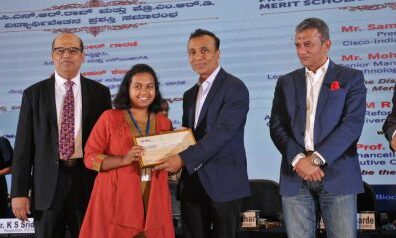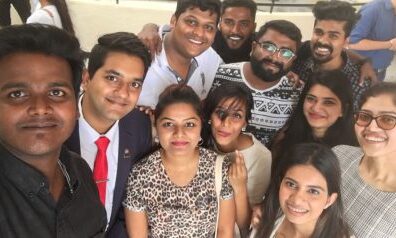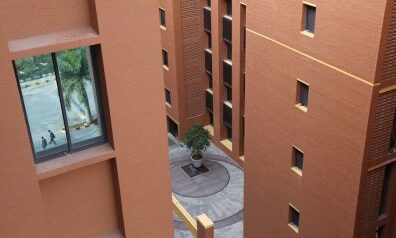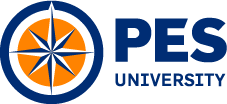Institute of Journalism and Mass Communication
B.Sc. (Hons) Journalism and Mass Communication
| Program Outline B.Sc. (Hons) Journalism and Mass Communication | |
| Duration | 4 Years (8 Semesters) for Hons / 3 Years (6 Semesters) for General |
| Affiliation | PES University |
| Campus | Ring Road (RR) Campus |
| Admission Test | PES Entrance Test |
The B.Sc. (Hons) Journalism and Mass Communication program at PES University offers a dynamic, industry-aligned curriculum integrating , New Media technologies, contemporary Journalism practices, immersive projects, internships , and field experiences. Students gain expertise in reporting, broadcasting, and digital storytelling, ensuring they are well-prepared for diverse careers in the evolving media landscape across the Globe. The program emphasizes experiential learning through study tours, industry collaborations, cutting-edge media studios, Hackathons, Studyathons, and simulations
Beyond academics, PES University provides a vibrant campus life that fosters leadership, citizen thought process, collaboration, and personal growth. Students engage in diverse sports, cultural activities, and student-led clubs, creating a well-rounded educational experience
Key Differentiators of this program at PESU
- State-of-the-Art Studios: State of the art news room/studio/interview rooms/Podcast rooms equipped with modern technologies provide a rich experience of video production, multimedia storytelling technologies, and Journalism
- Industry Immersion: Frequent Study visits to media companies, television studios, radio stations, and regular Talk session in the campus with media professionals, and networking opportunities together fostering industry alignment
- Cutting-Edge Curriculum: A dynamic Quant heavy, holistic approach blending electives, training, and innovative teaching methods followed by regular curriculum updates to align with industry trends and ensure relevant knowledge.
- Experiential Learning Approach: Practical exposure through internships, industrial visits, certification courses, case studies, and seminars, hackathons, Studyathons, simulations., Application-based research assignments and AI based components
- Continuous Assessment System: 50% internal assessments and 50% end-semester exams, comprising multiple assessment components such as research publishing, Projects, case studies, and worksheets, to simulate comprehensive learning.
- Industry Exposure & Networking: Frequent Workshops, hackathons, and summits led by professionals from top media organizations.
Programme Highlights
PESU X Factors
- Case Studies: dedicated class room sessions to discuss and write solutions to Real-world media challenges through in-depth case studies which are provided by top research institutes
- Research Papers: Hands-on opportunities and guidance to author impactful research papers as a part of their curriculum, focusing on the relevance
- Mentoring: Regular personalized guidance sessions from faculty and industry experts to align academic pursuits with career goals
- Peer-to-Peer Learning: Engaging learning environment fostering collaboration amongst students and faculty leading to a diverse knowledge sharing setup
- Exposure: Workshops, Industry Visits, Hackathon, Summits and Seminars led by media professionals to provide practical insights.
Specializations/ Domains
- Broadcast and Digital Journalism
- Advertisement & Public Relations
Focus Areas/ Key Subjects
- Years 1 & 2: Comprises of foundational courses in print, audiovisual, and multimedia journalism, Sound and Audio, Cinematography, Digital Photography, research Methodologies, writing, and reporting. Students gain hands-on experience through internships at the end of each academic year.
- Years 3 & 4: Specialization based subjects, Data visualization, complemented by departmental and interdisciplinary electives. Students culminate their learning with a capstone project, industry collaboration, or dissertation.
List of Subjects
Pedagogy Method
Industry/ Corporate Connect

Mr. N. Gopalaswami

Mr. S. Jaishankar

Mrs. Smriti Irani

Mr. Tejasvi Surya

Justice Mrs. Nagarathna

Mr. Deepak Vohra

Mr. Sachin Banavasi

Mr. R J Prashant

Mr. Samir Kagalkar

Mr. Narendra Jadhav
Experiential learning
- Blog/ Newsletter writing
- Video news Bulletin
- Podcasting
- Short film Making and Documentaries
- Audio /Video Advertisement creations
Future Career Prospects After Completing the Program
Graduates of this program acquire valuable skills that open doors to a wide range of career opportunities across various industries such as
- News Media: Print, broadcast, and digital journalism
- Social Media & Content Creation: Digital marketing, content writing, influencer marketing,
- Film & Advertising: Production, scriptwriting, Story board writing, Shooting, Prop Manager, Director of Photography, brand marketing, brand management, PR
Management, - Academia: Media studies, film studies, gender studies, political research, teaching and research positions
- Civil Society: NGOs, think tanks, development organizations, advocacy roles
- Corporate Communications: Internal communication, brand storytelling, crisis communication, Corporate Trainers, Technical writers, Content Writers.
- Entertainment & Cultural Management: Event planning, talent management, media consultancy, Media Management,
- Technology & Digital Media: UX writing, multimedia production, data journalism, Interface designs,
Potential Recruiters
- Thomson Reuters
- Amazon
- Flipkart
- CNN
- Accenture Interactive
- Economic Times
- Viacom
- Disney
- Zee Media
- Sun Network
- Samsu.io
- TV9
- Vishwavani
Curriculum Structure
Semester 1
| Subject |
| Communication & Language Structure |
| Media origin and Growth |
| Introduction to Journalism |
| Media Laws and ethics |
| Introduction to Mass Communication &Mass Comm Models |
| Digital Photography |
Semester 2
| Subject |
| Viewership Psychology |
| Advertising and Public Relations |
| Film Studies |
| Writing for Multimedia |
| Radio & Broadcast Studies |
| Media Economics |
| Social Internship |
Semester 3
| Subject |
| Videography - Productions and Practices |
| Media Culture and Society |
| Sports & Entertainment Journalism |
| Newsroom & Anchoring |
| Graphic design I |
| Data and Story telling |
Semester 4
| Subject |
| Advertisement & Documentary Production |
| Digital & Social Media Marketing |
| UI & UX Design Fundamentals |
| Investigative Journalism |
| Media & Market Research |
| Corporate Internship |
Semester 5
| Subject |
| Indian Knowledge System |
| Film Production and Management |
| Development& Environmental Communication |
| Anthropology |
| Influencer Management & Marketing |
Semester 6
| Subject |
| Internship |
Semester 7
| Subject |
| Advanced Cinematography and Special Effects |
| Corporate and Managerial Communication |
| Data Journalism & Visualization |
| Advanced Graphic Design |
| Sound Engineering |
| Geopolitics and Global Warfare |
Semester 8
| Course Title |
| Internship |
Semester 1
| Course Title |
| Literature |
| Media origin and Growth |
| Media Psychology |
| Media Writing |
| Introduction to Mass Communication |
| Advanced Excel |
| Photography |
Semester 2
| Course Title |
| Introduction to Journalism |
| Advertising and Public Relations |
| Mass Communication Models |
| Film Appreciation |
| Report Writing for Multimedia |
| Graphic Design I |
| Video Production I |
Semester 3
| Course Title |
| Media Law and Ethics |
| Media Culture and Society |
| Investigative Journalism |
| Geopolitics and Global Warfare |
| Visual Communication |
| Graphic Design II |
| UI & UX Design Fundamentals |
Semester 4
| Course Title |
| Broadcasting |
| Social Media Analytics |
| Media Economics |
| Data and Storytelling |
| Radio/Podcast Production |
| Video Production II |
| Sports Journalism |
Semester 5
| Indian Knowledge System |
| Film Production and Management |
| Media Research |
| Sound Engineering (Only for Hons) |
| Integrated Marketing Communications |
| News Room (Only for Hons) |
| Term Paper (Only for Hons) |
Semester 6
| INTERNSHIP |
| Ad Creative and Copyrighting |
Semester 7
| Cinematography and Lighting |
| Corporate Communication |
| Data Journalism |
| Environmental Journalism |
| Data Visualisation |
Semester 8
| Course Title |
| Internship |
Placements
Opportunities in the corporate sector are made available for outgoing students during their final semester for which professional training is imparted. Students are expected to have good academic records to ensure a definite placement
Placements
Opportunities in the corporate sector are made available for outgoing students during their final semester for which professional training is imparted. Students are expected to have good academic records to ensure a definite placement
Attend a Session
We hold regular events for prospective students and parents
Attend a Session
prospective students and parents
Study at PES
Study at PES
Contact Us
Read our FAQs or contact us:
Ring Road Campus /
Electronic City Campus:
080-10-297297
Hanumanthanagar Campus:
+91 80 22429391
Contact Us
Read our FAQs or contact us:
Ring Road Campus /
Electronic City Campus:
080-10-297297
Hanumanthanagar Campus:
+91 80 22429391
You may also be interested in

Giving to PES
The support extended by patrons like you, has been the primary reason for the substantial growth of our institution. Your contribution would greatly assist in making your PES a world-class institution.


Staying in Touch
Join Alumni Network: The PES website supports the alumni network. All a student needs to do is create an account and you can start connecting with our Alumni to access a range of opportunities and benefits.


Discovering our Newsletters
The Student Newsletter is your guide to what’s happening on campus and in the student community. Find out about PES events, leadership, career and the amazing achievements of your fellow PESU students!


